'Today, let us reaffirm our commitment to strive to realise Gandhiji’s dreams. His watchwords, truth and nonviolence, will continue to remain relevant for the whole world. He also taught us that rights and duties are but the two sides of the coin – indeed, the true source of rights is duty. Today we recall his lessons in compassion too – compassion not only for our human neighbours but also for our other neighbours, namely, flora and fauna, rivers and mountains.'

My Dear Fellow Citizens,
Namaskar!
I am happy to be addressing you on this historic occasion. On the eve of Republic Day, I offer you my heartiest congratulations! On January 26, 75 years ago, our founding document, the Constitution of India, came into effect.
The Constituent Assembly, after nearly three years of debates, adopted the Constitution on 26th of November in 1949. That day, 26th November, has been celebrated as Samvidhan Divas, that is, Constitution Day, since 2015.
Republic Day is indeed a matter of collective joy and pride for all citizens. Seventy-five years, someone might say, is only the blink of an eye in the life of a nation. No, I will say, not these past 75 years. This has been the time when the long-dormant soul of India has awakened again, taking strides to regain its rightful place in the comity of nations. Among the oldest civilisations, India was once known as a source of knowledge and wisdom. There, however, came a dark phase, and inhuman exploitation under colonial rule led to utter poverty.
Today, we should first recall the brave souls who made great sacrifices to free the motherland from the shackles of foreign rule. Some were well known, while some remained little known till recently. We are celebrating this year the 150th birth anniversary of Bhagwan Birsa Munda, who stands as a representative of the freedom fighters whose role in the national history is now being recognised in true proportions.
In the early decades of the twentieth century, their struggles consolidated in an organized nationwide independence movement. It was the nation’s good fortune to have the likes of Mahatma Gandhi, Rabindranath Tagore and Babasaheb Ambedkar, who helped it rediscover its democratic ethos. Justice, liberty, equality and fraternity are not theoretical concepts that we came to learn in modern times; they have always been part of our civilisational heritage. It also explains why the critics who were cynical about the future of the Constitution and the Republic when India had newly become independent were proven so thoroughly wrong.
The composition of our Constituent Assembly was also a testimony to our republican values. It had representatives from all parts and all communities of the country. Most notably, it had 15 women among its members, including stalwarts such as Sarojini Naidu, Rajkumari Amrit Kaur, Sucheta Kripalani, Hansaben Mehta and Malati Choudhury. When women’s equality was only a distant ideal in many parts of the world, in India women were actively contributing in shaping the destiny of the nation.
The Constitution has become a living document because civic virtues have been part of our moral compass for millennia. The Constitution provides the ultimate foundation of our collective identity as Indians; it binds us together as a family. For 75 years now, it has guided the path of our progress. Today, let us humbly express our gratitude to Dr. Ambedkar, who chaired the Drafting Committee, other distinguished members of the Constituent Assembly, various officers associated with and others who worked hard and bequeathed us this most wonderful document.
Dear Fellow Citizens,
The 75 years of the Constitution are marked by an all-round progress of a young republic. At the time of Independence and even later, large parts of the country had faced extreme poverty and also hunger. But one thing we were not deprived of was our belief in ourselves. We set down to create the right conditions in which everyone would have the opportunity to flourish. Our farmers toiled hard and made our country self-sufficient in food production.
Our labourers worked relentlessly to transform our infrastructure and manufacturing sector. Thanks to their sterling efforts, India’s economy today influences the global economic trends. Today, India is taking leadership positions in international forums. This transformation would not have been possible without the blueprint laid down by our Constitution.
In recent years, the economic growth rate has remained persistently high, creating job opportunities for our youth, putting more money in the hands of farmers and labourers, and also lifting more people out of poverty. The bold and far-sighted economic reforms will sustain this trend in the years to come. Inclusion is the cornerstone of our growth saga, distributing the fruits of developments as widely as possible.
As the government continues to assign top priority to financial inclusion, initiatives such as the Pradhan Mantri Jan Dhan Yojana, Pradhan Mantri Jeevan Jyoti Bima Yojana, Pradhan Mantri Suraksha Bima Yojana, MUDRA, Stand-Up India and Atal Pension Yojana have been expanded to provide more people access to a variety of financial support schemes.
Equally importantly, the government has redefined the notion of welfare, making basic necessities such as housing and access to drinking water a matter of entitlement. Every effort is being made to extend a helping hand to the marginalized communities, particularly of the Scheduled Castes, Scheduled Tribes and Other Backward Classes. For example, there have been pre-matric and post-matric scholarships, national fellowships, overseas scholarships, hostels and coaching facilities for the youth from the SC communities.
The Pradhan Mantri Anusuchit Jaati Abhyuday Yojana is making progress in reducing poverty among the SC communities by adding employment and income generation opportunities. There have been dedicated schemes for aiming for the socio-economic development of ST communities, including Dharti Aaba Janjatiya Gram Utkarsh Abhiyan and Pradhan Mantri Janjati Adivasi Nyaya Maha Abhiyan (PM-JANMAN). A Development and Welfare Board has been constituted for the De-notified, Nomadic and Semi Nomadic Communities.

Meanwhile, the focus on physical infrastructure development, including roads and railways, ports and logistics hubs, over the past decade has created a platform that will support growth for decades to come.
The way the government has used technology in the field of finance has been exemplary. A variety of digital payment options as well as the system of direct benefit transfer have promoted inclusion, bringing a significant number of people within the formal system. It has also brought unprecedented transparency in the system. In the process, within a few years we have created a robust Digital Public Infrastructure that is among the best in the world.
The banking system has been in a healthy condition after a series of bold measures such as the Insolvency and Bankruptcy Code, effecting a substantial reduction in the Non-Performing Assets of Scheduled Commercial Banks.
Dear Fellow Citizens,
We won freedom in 1947, but many relics of a colonial mindset persisted among us for long. Of late, we have been witnessing concerted efforts to change that mindset. Among the most noteworthy of such efforts was the decision to replace the Indian Penal Code, the Code of Criminal Procedure and the Indian Evidence Act with the Bharatiya Nyaya Sanhita, the Bharatiya Nagarik Suraksha Sanhita and the Bharatiya Sakshya Adhiniyam. Based also on Indian traditions of jurisprudence, the new criminal laws place the delivery of justice instead of punishment at the centre of the criminal justice system. Moreover, the new laws grant top priority to countering crimes against women and children.
Reforms of such magnitude require an audacity of vision. Another measure that promises to redefine the terms of good governance is the Bill introduced in Parliament to synchronise election schedules in the country. The ‘One Nation One Election’ plan can promote consistency in governance, prevent policy paralysis, mitigate resource diversion, and reduce the financial burden, apart from offering many other benefits.
There has also been a fresh engagement with our civilisational heritage. The ongoing Mahakumbh can be seen as an expression of the richness of that heritage. An exciting array of initiatives is underway in the domain of culture to preserve and revitalise our traditions and customs.
India is a hub of great linguistic diversity. In order to conserve as well as celebrate this richness, the Government has recognised Assamese, Bengali, Marathi, Pali and Prakrit as classical languages. This category already includes Tamil, Sanskrit, Telugu, Kannada, Malayalam, and Odia. The Government is proactively promoting research in 11 classical languages now.
I look forward to the completion of India’s first Archaeological Experiential Museum in Vadnagar of Gujarat, being developed next to an excavation site that shows evidence of human settlement from around 800 BCE. The museum will bring together in one place a wide range of arts, crafts and cultural elements from different eras.
Dear Fellow Citizens,
It is, after all, our young generation that is going to shape the India of tomorrow. Education, in turn, shapes these young minds. Therefore, the Government has increased its investment in education and made every effort to improve every parameter related to this sector. The results so far are more than encouraging. The last decade has transformed education, in terms of quality of learning and physical infrastructure and digital inclusion.
For the medium of instruction, the regional languages are promoted at more levels. It is not surprising that there has been a notable improvement in students’ performance. I am glad to learn that women teachers have played a crucial role in this transformation, since more than 60 percent of those who became teachers in the last decade are women.
The expansion and mainstreaming of vocational and skill education is a welcome development. This is also supplemented now by the scheme to provide our youth internship opportunities in the corporate sector.
With a stronger foundation of the school-level education, India has been scaling new heights in various branches of knowledge, particularly in science, along with technology. For example, India stands sixth in terms of intellectual property filings in the world. We have consistently improved our ranking in the Global Innovation Index, moving from 48th position in 2020 to 39th in 2024.
With rising self-assurance, we are increasing our participation in cutting-edge research with a series of initiatives. The National Quantum Mission aims to create a vibrant and innovative ecosystem in this new frontier of technology. Another noteworthy beginning is with the National Mission on Interdisciplinary Cyber Physical System, which plans to focus on several advanced technologies including artificial intelligence, machine learning, robotics and cyber security. These technologies were called futuristic till recently, but they are fast becoming part of our daily lives.
The Genome India Project has been not only an exciting venture in exploring nature; it is also a veritable defining moment in the history of science in India. Under its flagship programme, the genome sequencing of 10,000 Indians have been made available for further research only this month. This pathbreaking project will open new vistas in biotechnology research and also give a fillip to the public healthcare system.
The Indian Space Research Organisation has been taking giant leaps in space in recent years. This month, the ISRO once again made the nation proud with its successful Space Docking Experiment. India has now become the fourth country in the world to have this capability.
Our increasing confidence levels as a nation are also reflected in the arena of sports and games where our players have scripted thrilling success stories. Last year, our athletes made a mark in the Olympic Games. In the Paralympic Games, we sent our largest-ever contingent, who came back with our best-ever performance. Our chess champions impressed the world, as our men and women won the gold at the FIDE Chess Olympiad. The achievements in the sports during the year 2024 were capped by D. Gukesh, who became the youngest World Chess Champion.
Supported by a great improvement in training facilities at the ground level, these sportspersons have made us proud with their winning drive and inspired the next generation to aim higher and higher.
Our brothers and sisters living abroad have taken the best of our culture and civilisation to different parts of the globe and have made us proud with their achievements in diverse fields. They have always considered themselves to be a part of the India Story. As I said at the Pravasi Bharatiya Divas earlier this month, I am confident of their proactive and enthusiastic participation in the making of a Viksit Bharat, a developed India, by the year 2047.
Dear Fellow Citizens,
Thanks to substantial and concrete progress in a wide range of areas, we are marching towards the future, holding our heads high. The key to our future is our youth and especially the young women. Their dreams are moulding the India of tomorrow, when we will be celebrating the centenary of our Independence. And when today’s children will salute the tricolour on 26th January of 2050, they will tell their next generation that this great quest would not have been possible without our incomparable Constitution guiding them along the way.
Our future generations will also keep in mind the mission of Independent India in the world. In the words of the Father of the Nation, Mahatma Gandhi [and I quote]
“If Swaraj was not meant to civilize us, and to purify and stabilize our civilization, it would be nothing worth. The very essence of our civilization is that we give a paramount place to morality in all our affairs, public or private.” [unquote]
Today, let us reaffirm our commitment to strive to realise Gandhiji’s dreams. His watchwords, truth and nonviolence, will continue to remain relevant for the whole world. He also taught us that rights and duties are but the two sides of the coin – indeed, the true source of rights is duty. Today we recall his lessons in compassion too – compassion not only for our human neighbours but also for our other neighbours, namely, flora and fauna, rivers and mountains.
Each of us must contribute to the efforts to counter the global threat of climate change. There have been two exemplary initiatives in this regard. At the global level, India is leading a mass movement, called Mission Lifestyle for Environment, to inspire individuals and communities to be more pro-active in protecting and preserving the environment.
Last year, on World Environment Day, we launched a unique campaign, 'Ek Ped Maa Ke Naam', paying tribute to the nurturing power of our mothers as well as of Mother Nature. Its target of planting 80 crore seedlings was achieved ahead of the deadline. The world can learn from such innovative moves that people can adopt as their own movements.
Dear Fellow Citizens,
Let me once again congratulate you all on the occasion of Republic Day. My congratulations to the soldiers guarding our borders as well as police and paramilitary personnel keeping it safe within the borders. My congratulations also to the members of the judiciary, the bureaucracy and our missions abroad. My best wishes to you in all your endeavours.
Thank you.
Jai Hind!
Jai Bharat!

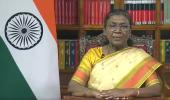
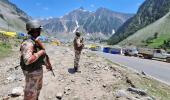
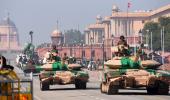




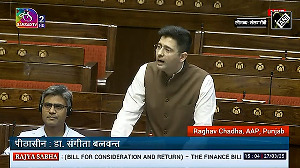
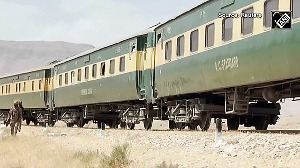

 © 2025
© 2025